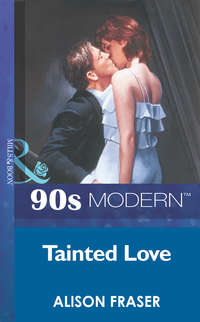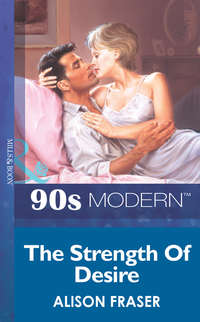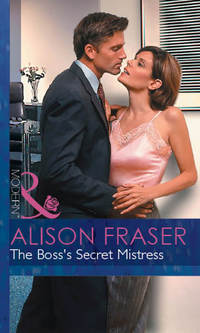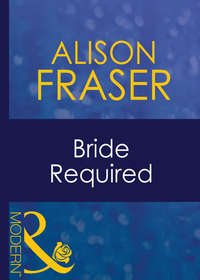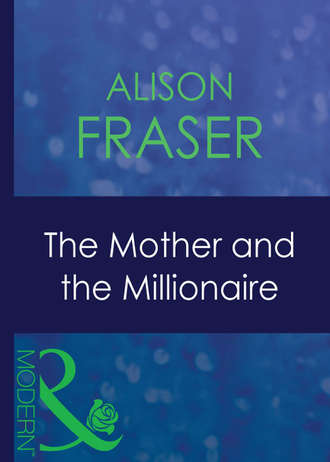
Полная версия
The Mother And The Millionaire
She limited herself to a nod.
‘Not very reliable, are they,’ he suggested, ‘leaving you out here on your own? Anyone could come along.’
Fake concern? Had to be.
It prompted Esme to retaliate with a dry, ‘They already have.’
A jibe he ignored as he ran on, ‘I’ll give you a lift to wherever you’re going.’
She was surprised into a passing polite, ‘No, thanks.’
‘All right, suit yourself.’ He shrugged. ‘I’ll just hang around until he comes.’
‘No, you mustn’t!’ Esme didn’t have to feign horror at the idea.
He looked at her curiously. ‘Jealous type?’
He had the wrong idea, totally, but Esme didn’t disabuse him. The important thing was for him to be gone by the time the bus arrived.
‘Yes, yes, he is,’ she agreed. ‘I mean really. He’ll be here any second and if he sees you…’
Esme glanced fearfully down the road and left him to fill in the rest.
He did so with darkening brow. ‘Is that why you were so upset when I kissed you?’
Esme nodded. It was too good an excuse to waste. In fact, a little embellishment wouldn’t go amiss.
‘He’s very possessive. Doesn’t like me even speaking to other men. So please, Jack, just go.’ She trained appealing blue eyes on him.
Jack saw traces of the old Esme and was torn. He suddenly felt responsible for her, certain that any man so possessive had to be bad news. But then what right had he to interfere? He had been away too long.
‘Please,’ Esme repeated with genuine urgency as she heard the bus in the distance.
‘Yes, all right.’ He remained a moment longer, holding her anxious gaze, then, putting the car into gear, roared off along the highway.
If Esme felt guilty, she also felt justified as the bus came into view, passing Jack going in the opposite direction. Talk about close calls.
‘What’s wrong?’ Harry asked as she practically pulled him off the bus and hustled him through the door in the wall.
‘Nothing.’ She just didn’t trust Jack not to change his mind and return.
Because that was something else she remembered about him. How protective he’d been at times, looking out for her when she’d been hurt, physically and emotionally. Her hero until he’d proved otherwise.
‘So how was school?’ She tried to sound normal to Harry and it came out forced.
Her son frowned before shrugging. ‘The same.’
‘And those boys?’ This time genuine worry.
He pulled a face.
Esme interpreted that as bad. ‘Look, if you’ll let me go into school—’
‘No,’ Harry cut across her, ‘you mustn’t, Mum. You’ll just make it worse.’
Perhaps he was right. Esme could see his point. Having your mother go wading in on your behalf to complain about Dwayne and Dean, the twins from hell—or at least the roughest housing estate in Southbury—wasn’t going to do his street cred much good, but she felt so helpless.
‘OK, OK.’ She put an arm round his shoulder and gave it a squeeze. ‘But if it escalates, you must tell me.’
He gave a brief nod.
Unsure if he understood, Esme added, ‘By escalate, I mean—’
‘I know, Mum,’ he cut in once more. ‘If they threaten me with an AK47, I have to tell you, right?’
He gave her a wry smile and she smiled back, although hardly reassured.
‘I realise you’re joking, Harry,’ she ran on, ‘but do any of the boys carry weapons—penknives, say?’
He shrugged again before saying, ‘They’re not allowed.’
That hardly answered the question, either. His junior school, City Road, had a nicely printed booklet of rules and mission statements on bullying, but that hadn’t stopped her son becoming the target for boys in the year group above him.
Esme watched as he strode ahead of her now. Nothing visible could mark him down for derision. He was tall for his age and, to her eyes, a good-looking boy with a shock of blond hair and a thin, clever face, but no spectacles or physical weaknesses or strange mannerisms that would single him out.
The teacher had suggested the fault might lie elsewhere. In a school dominated by the local accent, Harry talked differently—in the same regionless precise English that had been encouraged by Esme’s various boarding-schools. But that wasn’t all. There was his cleverness, indisputable and hard to conceal. Harry had tried, very quickly learning not to put up his hand in class or work too hard or say anything to draw attention to it. But it was part of him, the way he was, self-contained and independent, able to absorb everything at a glance without conscious effort.
Esme had never been able to decide whether it was a curse or a blessing, but she didn’t pride herself on it. She knew it didn’t come from her.
Her contribution was his shock of blond hair and fair-skinned looks but otherwise he was someone else’s child. It wasn’t a striking likeness. It was there, however, in the eyes, solemnly grey to her sky-blue, and some of his expressions. There, if you cared to look. Enough to feel a need to keep him and his father apart.
When they reached the cottage, Harry immediately excused himself. He left his bag in the hall and went up to his room built into the attic space.
Esme knew he would be already logging on to his computer, his intellectual mainstay. She might have tried to stop him if she could have offered an alternative, but, without brothers or sisters or children to play with, it was difficult.
Her mother had suggested boarding-school more than once but Esme had neither the money nor the inclination to send Harry away, having hated boarding herself.
Besides, she couldn’t imagine life without him. Not that it had been easy in the early years. She’d been a frightened teenager, back at school when she’d realised she might be pregnant. Morning sick, then simply sick with anxiety, she had actually lost weight, so her bump had gone unnoticed almost to the seventh month. Then discovery had been followed by disgrace and dispatch homewards.
Recriminations had given way to arrangements. A cousin of her mother’s in Bath. Adoption at birth. Forget it ever happened.
Esme had gone along with it all up until a twenty-hour labour had thrust her rudely into adulthood. Everything had changed after that. She’d looked at her newborn son and, from somewhere, had found the courage to defy her mother’s ultimatum: come home minus baby or don’t come home at all.
Social Services had helped to get her into a mother and baby hostel. It had been a steep learning curve. On top of her new-found responsibility for a tiny human had come the shock of being out in the real world. She’d ceased feeling hard-done-by when she’d heard the other girls’ stories. While they’d talked of bad-news boyfriends and abusive stepfathers and drunken mothers, her childhood had seemed a fairy story.
In the hostel she’d learned to cook and clean and wash; she’d also learned to curse and swear and stand up for herself. From there she’d moved to a flat in Bristol, ten flights up with a lift that rarely worked.
She’d stuck it out until a two-year-old Harry had fallen on the stairwell. A grazed knee—no big deal. But in the corner, inches from his hand, a discarded syringe.
It was at that point she’d swallowed her pride and taken the bus home. Her mother had been speechless for the first thirty seconds, barely recognising her younger daughter in this stick-thin, badly dressed young woman, then, drawing breath, she’d launched into a tirade of I-told-you-sos before eventually allowing Esme through the door.
In this respect Rosalind Scott-Hamilton had behaved pretty much as her daughter had anticipated. The true surprise had been her reaction to Harry. While bundled up in the pushchair and covered by a rain-hood he’d been an anonymous lump, but when he’d woken and climbed out of his pushchair to stand silently gazing at his grandmother it had appeared even she wasn’t immune to his charm.
‘What a perfectly beautiful little boy!’ she’d exclaimed in utter surprise.
Esme hadn’t known whether to be gratified or insulted. She’d certainly understood the implication—how could someone as ordinary as her younger daughter have produced such a son?
Still, it was Harry who had helped bridge the gap. Not that her mother acted the part of fond grandmother—she wouldn’t even allow Harry to use the term—but there was an affection there that allowed her to ignore his ignominious start in life.
Thus, Esme had rejoined the fold, but only partly, setting up home in the cottage and trading some of her acquired domestic skills for petty cash from her mother until her twenty-first birthday had brought a small trust fund from her godmother.
It was hardly an exciting existence but she’d been content enough till today. Now it seemed under threat and she couldn’t wait to phone her mother.
‘Darling—’ Rosalind Scott-Hamilton called most female acquaintances that, having lately taken on the persona of an ageing film star ‘—I was going to ring you tonight. How did it go, the viewing?’
Esme breathed deeply before ignoring the question and demanding instead, ‘Mother, are you aware who the viewer was?’
‘Who the viewer was?’ Rosalind gave herself time to think. ‘Some internet millionaire, I believe. Cash buyer, according to the agent. Why?’
‘It’s Jack Doyle,’ Esme told her bluntly.
‘Jack Doyle?’ Her mother was clearly trawling through her memory for the name.
‘Mrs Doyle’s son,’ Esme prompted.
‘Mrs Doyle!’ Her mother echoed this name, too.
Esme sighed heavily. ‘Mrs Doyle. Our cook. Lived in the cottage.’
‘Yes, yes,’ Rosalind Scott Hamilton dismissed, ‘I do know who Mrs Doyle is, or was. I was expressing surprise…Jack Doyle. Who’d have thought it? After all these years and in the market to buy Highfield… Did he say if he was interested?’
‘No, Mother, he didn’t!’ This conversation was not going how Esme had planned.
‘Well, he must be,’ her mother ran on. ‘I mean, he knows what the place is like and it hasn’t changed much from when he was a boy. The question is whether he can afford it—or was he just on a sentimental journey? Perhaps Robin can make a few enquiries in the City.’
The City was the heart of London’s money markets from where her stepfather did his wheeling and dealing.
‘But surely you wouldn’t sell to Jack Doyle even if he was interested?’ Esme appealed.
‘Why not?’
‘Well…all the things you said about him once.’
To her mother, Jack had been a jumped-up working-class boy who had dared to imagine himself suitable for one of her daughters just because he’d managed a first from Oxford.
‘Things,’ her mother muttered vaguely. ‘Oh, you mean the time he fancied his chances with Arabella? Yes, that was quite absurd. Still, in hindsight, who knows? She might have been better off with him than that character she did marry.’
Esme was speechless for a moment. How the world had changed! Her mother had been absolutely delighted when Arabella had married Franklin Homer, supposed heir to an American banking fortune. Only the fortune seemed to have dissolved along with the marriage.
‘Anyway,’ her mother resumed, ‘if Jack Doyle wants to buy Highfield, then good luck to him.’
Esme’s heart sank. ‘You can’t mean that, Mother.’
‘Whyever not?’ An impatient edge crept into her mother’s voice. ‘I really am surprised at you, Esme. I would have thought you’d be delighted at the whole idea. You’re the one who has always championed the underdog, maintained there is no fundamental difference between the working class and us, apart from money.’
Esme didn’t know about ‘championing’ the underdog. She was usually too busy looking out for herself and Harry. But she had always deplored her mother’s blatant snobbery.
‘Anyway, I need the money,’ her mother continued. ‘You know that, darling. I’ve explained.’
Esme could have said, No, you don’t. You have a husband as rich as sin. But her mother saw Highfield as her insurance policy in case anything happened to her second marriage.
‘You’re bound to sell it eventually,’ Esme pointed out. ‘You don’t have to sell it to Jack Doyle.’
‘No, but it would be simply perverse to turn down an offer from him,’ Rosalind argued back. ‘And I don’t really see the problem. It’s not as if you and Jack were ever involved.’
A silence followed. Esme could have broken it with the knowledge she’d always withheld from her mother, but she doubted it would change anything.
She changed tack instead. ‘Well, at least make sure the estate agent clarifies what’s included in the sale.’
‘What do you mean, darling?’
Was it her imagination or did her mother sound cagey?
‘He thinks the cottage is up for grabs. I told him it wasn’t but he didn’t believe me. Perhaps Connell, Richards & Baines could draw his attention to the fact?’
‘Yes, well…’ There was a pause while her mother decided on her phrasing.
‘Mother?’ Esme prompted with growing suspicion. ‘You haven’t changed your mind? You said I could have a life interest in the cottage.’
‘I know, darling, and I meant it,’ her mother claimed, ‘but James Connell says it just isn’t feasible, parcelling up the estate that way. But don’t worry, you should be all right. You’re a sitting tenant.’
Esme did not believe this. ‘And if we’re not all right, what do Harry and I do then?’
‘Well, obviously you’d have to find somewhere else,’ Rosalind sighed in reply, ‘but would that be so awful? I mean, the cottage is very basic. Little better than staff quarters.’
‘We like it,’ Esme claimed, temper finally rising, ‘and, compared to bed and breakfast accommodation for the homeless, it’s palatial!’
‘Don’t be absurd, darling!’ Rosalind snapped back. ‘You have other alternatives.’
‘Like?’ Esme was confident that her mother wasn’t about to invite Harry and her to live in her Kensington four-storey in London.
‘I don’t know,’ Rosalind replied just as crossly. ‘I’m sure there are lots of places you could go, if you would stop playing the martyr… I’ve heard Charles Bell Fox would have you at the drop of a hat, and you could do a lot worse.’
Esme agreed. She could. But it was hardly any business of her mother’s.
‘Charles and I are just friends,’ Esme could claim in perfect conscience.
‘Only because you won’t let the poor boy be anything else,’ her mother countered, ‘and goodness knows why. He’s rich, he’s eligible, he’s even quite good-looking. What are you waiting for?’
‘Nothing,’ Esme replied tartly. ‘I’ll call him up now, shall I? Ask if he’d like us to shack up together?’
Her mother gave a weary sigh. ‘Is that meant to be funny?’
‘Not especially.’
‘Because it isn’t—and you know perfectly well I was talking about marriage, not cohabitation. I think you’ve already done enough of that, don’t you?’
‘What?’ Esme was genuinely puzzled for a moment. She’d never lived with anyone other than her family. ‘Oh, right, my fall from grace? I don’t think casual sex counts as cohabitation, Mother.’
A loud tut came down the phone. At times her mother liked to pretend she was a prude.
‘Really, Esme,’ her mother reproved, ‘it’s nothing to be proud of—having a baby with someone you barely knew. What have you said to Charles about Harry?’
‘Nothing.’ Charles had scrupulously avoided the subject.
‘Well, I trust when you do,’ Rosalind continued, ‘you’ll dress it up a bit. Falling into bed with some Italian boy you met in a café sounds very loose.’
Esme controlled an errant desire to laugh. Such a lame story, it was a source of perennial wonder that her mother still believed it.
‘OK, Mother, I’ll bear it in mind,’ Esme replied, tongue-in-cheek, ‘when and if Charles ever asks me to marry him.’
‘Good.’ Her mother seemed oblivious of any irony. ‘Because he really is your best bet. You certainly can’t expect me to keep bailing you out… Now I really must go. I’m having people for dinner.’
Boiled or fried? Esme was tempted to ask, but was already holding a dead line. She replaced the receiver and pushed a worried hand through her hair before hearing a sound behind her.
She turned to find Harry standing on the open staircase from his bedroom. He looked vaguely troubled. How much had he overheard?
He stared at her briefly before saying, ‘I’m hungry. What’s for tea?’
A normal, ordinary-boy question. Esme allowed it to dispel her fears and led the way through to the kitchen as she declared, ‘We have a choice: pizza, pizza or pizza.’
Harry rolled his eyes at this familiar joke but joined in by saying, ‘OK, pizza. The second one.’
‘That’s pizza with pepperoni and olives,’ she announced.
It elicited a boyish, ‘Yuk. I’ve changed my mind. I’ll have pizza, the first one.’
‘Anchovies.’
‘Double yuk.’
‘Ham and mushroom?’
‘Yeah, suppose that’ll do.’
‘But no picking off the mushroom,’ she warned as she got the ready-made meal out of the freezer, ‘and you’ll have it with orange juice so at least something healthy passes your lips today.’
He pulled a face. ‘I had chips for lunch. That’s a vegetable.’
‘Potatoes are a vegetable,’ she corrected. ‘Fry them and we’re talking a whole new ballgame.’
‘Like the difference between football and pinball,’ he suggested wryly.
‘Quite,’ she agreed, wrestling with an oven shelf that refused to pull out.
The cooker was ancient. It had been here in the time of the Doyles and must have been antiquated then. A poor tool for a woman like Mary Doyle, who had been a wonderful cook.
A lovely person, too. Kind and thoughtful and endlessly patient. That was how Esme remembered her, anyway.
She’d died that same year, before Harry had been conceived, so she’d never seen her little grandson.
It was sad, really. Though her own mother wouldn’t even let Harry call her grandmother, she imagined Mary Doyle would have been different.
Would she have told her? Esme suspected there would have been no need. She would have seen. The smile was Jack’s, as was the temperament. Maybe it was elemental, a recognition of genes shared.
Thank God it hadn’t been put to the test that afternoon. But what if Jack actually bought Highfield? Wouldn’t a meeting of man and boy be inevitable?
She shook her head. Yes, it would, but it wasn’t going to happen. It couldn’t.
Esme had no logical reason for this certainty, just blind faith and the fact she couldn’t allow herself to believe otherwise.
CHAPTER THREE
ESME dismissed the Doyles from her thoughts and concentrated on making tea, which they ate at the kitchen table.
Later, with Harry in bed and the cottage gravely silent, she tried to focus on her latest project. She’d been commissioned to design a master bedroom for a mock-Tudor house owned by a City dealer friend of her stepfather and his advertising-executive wife, but it was proving difficult as the two had quite conflicting ideas on what they wanted. Esme, who had fallen into interior design more by chance than planning, had come to accept the work required enormous tact and patience as well as flair and a good eye.
She pored over colour charts now, hoping for inspiration, but her mind kept wandering. Back to that summer almost ten years ago.
She’d come home for the holidays to find Jack there. He’d returned from Ireland to wait for the results of his finals and dispose of his mother’s things. Her mother had allowed him to remain in the cottage, paying him subsistence money for gardening duties and general repairs.
It showed how little her mother had really known Jack. To her, he’d been the cook’s son, and therefore suited to manual work. Esme, of course, had known him a lot better. He’d tutored her, ridden with her and babysat on more than one occasion. Undoubtedly strong and fit, he, nevertheless, had not been handyman material. Give him the intricacies of a computer to fathom, and he’d be your man. Give him a stable door off its hinges and he’d be resolutely uninterested.
He’d put in the hours—mowing the lawns on the ride-on tractor, feeding the two horses left in the stables, washing down cars and the yard—but no more.
Esme had watched from a distance, wishing she could keep him company as she had so many times before. But something had changed. Him or her or the situation.
It wasn’t that she’d had nothing to say to him. On the contrary, she had longed to go up and ask him how he was and tell him how much she, too, missed his mother. It had just seemed that the gap between them—social, age, intelligence—had grown into a chasm since the Christmas when they’d last talked.
Or maybe it had been Arabella. She’d been home, too, from the Swiss finishing-school that had been meant to teach her to be a lady but had, to Esme’s mind, failed miserably. Bored and kicking her heels while a socially acceptable job was being found for her in London, she had looked for a way to kill time and settled on Jack.
At first Esme hadn’t worried. Jack had always been offhand to Arabella and at times obliquely rude.
Esme wondered sometimes if that was why she’d become infatuated. All her life she’d played second fiddle to Arabella, with Jack the only one seeming to prefer her.
Until that summer, of course, when August brought a heat-wave and with it a kind of madness.
Or maybe it had just been sex.
She’d felt it, too. Weak at the knees every time Jack had come near. Tongue-tied and pathetic whenever he’d smiled her way. Morose with her awkwardness. Shot through with jealousy as his thing with Arabella had developed.
She would have borne it better if Arabella had been discreet. But that had been the whole point. Arabella had wanted her to know she was sleeping with ‘the stable boy,’ as she’d referred to Jack, and, in doing so, had made it plain she was just amusing herself.
Even then it had been Jack Esme bled for, so much so that she’d felt compelled to tell him the truth.
‘I know about you and Arabella,’ she declared, only to be fixed by one of his emotionless stares. ‘I don’t want to interfere or anything.’
‘Then don’t,’ he advised, almost curtly.
It hurt. Jack never talked to her like that. Not normally.
She couldn’t stop. She didn’t want to see him hurt in turn. ‘I just wondered if you realised,’ she ran on determinedly, ‘that she’s not serious about…well, about you and her.’
He looked annoyed, more than annoyed, although he responded in a kind of joke. ‘So don’t go buying any engagement rings, is that it?’
‘Something like that.’ She nodded.
His eyes narrowed further on her grave face, assessing her motives, before he chose to laugh back. ‘Don’t worry, I’ve still got the receipt.’
‘What?’ It took Esme a moment to understand. ‘Oh, right.’
Another joke…or was it?
‘The question is, who’s put you up to this pep talk?’ he considered aloud. ‘Your lovely sister or the family matriarch?’
‘Who?’
‘Your mother.’
‘Oh.’ Esme was made to feel dense. ‘No, nobody. I just thought… Never mind.’
She decided it would be impossible to explain why she was concerned without exposing her own feelings.
He was already looking at her in a funny way, and she could feel colour ebb and flow in her cheeks.
‘Forget I said anything,’ she urged instead.
‘OK, I will.’ He echoed her tone but a suspicion of a smile was lurking at the corners of his mouth.
No longer cross with her. Just amused. Was that better or worse?
Worse, maybe. It certainly added to her mortification and, turning, she walked away.
He called to her, ‘Midge, wait up.’ But, in response, she quickened her footsteps until she’d broken into a run, fleeing back to the house and the sanctuary of her bedroom.
After that, she couldn’t bear to face him or Arabella—she imagined him relaying the conversation to her—and became a virtual recluse, skulking in her room apart from at mealtimes.
The incident at dinner happened a week later. To Esme, it came out of the blue. Not, it seemed, to her mother or Arabella.






